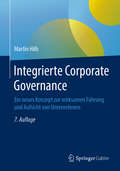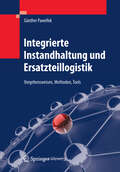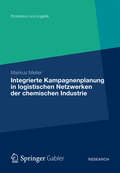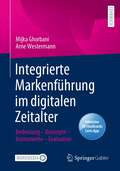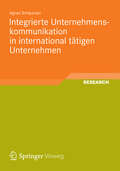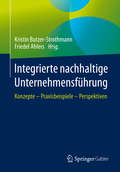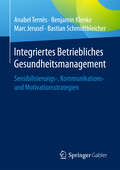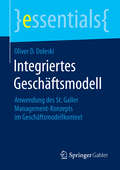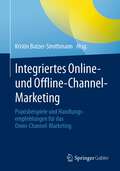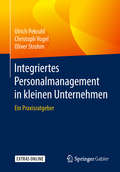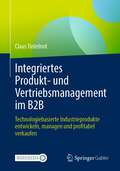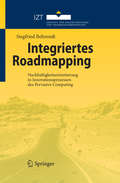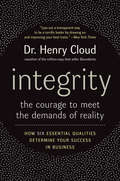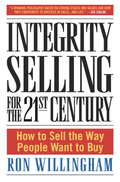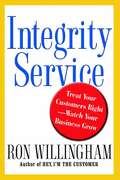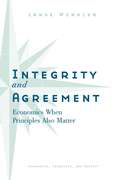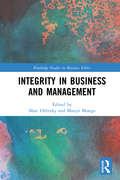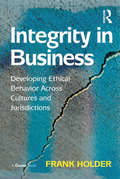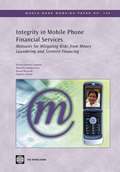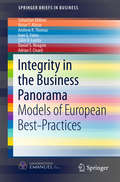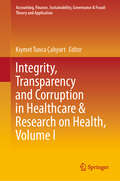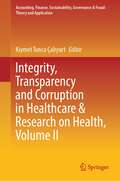- Table View
- List View
Integrierte Corporate Governance: Ein neues Konzept zur wirksamen Führung und Aufsicht von Unternehmen
by Martin HilbIn diesem Buch lernen Sie den innovativen Corporate-Governance-Ansatz kennenMartin Hilb verbindet in diesem Buch die Stärken traditioneller Corporate-Governance-Modelle zu einem integrierten Corporate-Governance-Ansatz. Daraus entwickelt er ein innovatives Konzept zur wirksamen Führung und Aufsicht von Unternehmen. Die in seinem Buch über New Corporate Governance vorgestellten Instrumente hat Hilb selbst entwickelt und anschließend in der Praxis erprobt. Das Werk richtet sich an Unternehmen sowie an Aufsichts- und Verwaltungsräte.Aktuelle Fallstudien und PraxisberichteIn seinem Buch „Integrierte Corporate Governance - Ein neues Konzept zur wirksamen Führung und Aufsicht von Unternehmen“ behandelt Autor Martin Hilb Fragen zu:Boardstrategie und -kooperationAuswahlZusammensetzungBeurteilungHonorierung und Förderung von Board- sowie VorstandsmitgliedernEvaluation von Führungsgremien Aktuelle Fallstudien und Praxisberichte veranschaulichen die vorgestellten Konzepte.
Integrierte Instandhaltung und Ersatzteillogistik
by Günther PawellekIn dem Leitfaden wird die Analyse- und Entscheidungssystematik zur Gestaltung integrierter Instandhaltung und Ersatzteillogistik beschrieben. Gezeigt wird, wie die Prozesse mit einem integrierten Planungsansatz und neuen Analyse- und Bewertungstools auch langfristig verbessert werden können: durch zielgerichtetes und strukturiertes Vorgehen, die Einbeziehung anlagen- und komponentenspezifischer Aspekte und durch permanentes Monitoring. Das Buch richtet sich an Ingenieure sowie Führungskräfte und Mitarbeiter in Instandhaltung und Ersatzteillogistik.
Integrierte Kampagnenplanung in logistischen Netzwerken der chemischen Industrie
by Markus MeilerIn der chemisch-pharmazeutischen Industrie erfolgt die Produktion häufig in global operierenden Unternehmen verteilt über viele Standorte. Mit der fortschreitenden logistischen Vernetzung erhöht sich die Planungskomplexität beträchtlich. Daher werden heute überwiegend computergestützte Planungssysteme eingesetzt, welche sowohl die netzwerkweite Kampagnenplanung als auch die standortbezogene Detailplanung mit Hilfe von quantitativen Methoden unterstützen. Markus Meiler entwickelt neuartige Methoden des Operations Research, die einen wichtigen Beitrag bei der Entscheidungsfindung im Rahmen einer standortübergreifenden Kampagnenplanung leisten können.
Integrierte Markenführung im digitalen Zeitalter: Bedeutung – Konzepte – Instrumente – Evaluation
by Arne Westermann Mijka GhorbaniDieses Lehrbuch gibt einen fundierten Überblick über Bedeutung, Konzepte, Instrumente und Evaluation der integrierten Markenführung. Dabei werden folgende Fragen betrachtet: Welche Rolle spielen Marken im Leben der Menschen in einer zunehmend digitalen Konsumgesellschaft? Was sind die wichtigsten Trends in der Markenführung? Wie hat sich die Markenführung im Zeitalter der Digitalisierung und Technologisierung verändert? Wie können Marken neue Instrumente wie Augmented Reality, Künstliche Intelligenz oder Big Data nutzen, um langfristig relevant zu bleiben? Illustriert und mit Leben gefüllt werden die Ausführungen, indem Anna und Lukas, zwei fiktive Studierende, auf ihrem Weg durch die Welt der Marken begleitet werden. Darüber hinaus enthält das Buch zahlreiche Best-Practice-Beispiele und Case Studies und zu jedem Kapitel stehen interaktive Flashcards zu Verfügung: Laden Sie die Springer Nature Flashcards-App herunter und nutzen Sie exklusive Inhalte, um Ihr Wissen zu prüfen und zu vertiefen. Dieses Buch richtet sich an Studierende und Dozierende in den Fachbereichen Marketing, Management und Kommunikationswissenschaften sowie an alle, die sich einen Überblick über die Bedeutung von Marken und die Möglichkeiten, sie zu inszenieren, verschaffen wollen.Der Inhalt• Bedeutung von Marken für Unternehmen und Konsumenten• Grundlagen der Markentheorie• Markenwirkung und Konsumentenverhalten im digitalen Zeitalter• Strategische Markenführung• Operative Markenführung• Markenbewertung: Markenstärke und Markenwert• Aktuelle und zukünftige Entwicklungen
Integrierte Unternehmenskommunikation in international tätigen Unternehmen
by Agnes SchipanskiAgnes Schipanski entwickelt auf Basis einer umfangreichen Literaturanalyse ein umfassendes Modell der international integrierten Unternehmenskommunikation, das transnational orientiert ist. Dabei spielen Managementfunktionen, die transnationale und transkulturelle Strategie sowie die Prozessorganisation eine zentrale Rolle. Kern des Modells ist ein Reorganisationsprozess, dessen Ergebnis eine transnational modulare Kommunikationsorganisation mit Netzwerkcharakter ist. Sie zeichnet sich durch modulare Organisationseinheiten, die Dezentralisierung von strategischen Entscheidungskompetenzen und ein integriertes Kommunikationsnetzwerk aus. Das Modell wendet die Autorin auf das internationale Landtechnikunternehmen CLAAS in Form einer Feldstudie, Einzelfallanalysen und Vergleichsstudien an.
Integrierte nachhaltige Unternehmensführung: Konzepte – Praxisbeispiele – Perspektiven
by Kristin Butzer-Strothmann Friedel AhlersFinden Sie in diesem Werk die richtungsweisenden methodischen Überlegungen des Integrierten Management-Ansatzes für die Umsetzung einer nachhaltigen Unternehmensführung!Die Thematik wird sowohl theoretisch-konzeptionell als auch praxisnah-fallbezogen mit einem intendierten mittelbaren „Brückenschlag“ zwischen beiden Perspektiven beleuchtet. In Teilen der einschlägigen Fachliteratur wird die nachhaltige Unternehmensführung als integrales bzw. integriertes Konzept gekennzeichnet. Der Integrationsfokus sollte sich dabei auf die unterschiedlichen betrieblichen Ebenen und Subsysteme ausrichten. Dem weithin anerkannten St. Galler-Konzept "Integriertes Management" folgend, geht es darum, dass der auf der normativen Ebene postulierte Nachhaltigkeitsgedanke über die Strategie in operative Handlungsvollzüge einfließt und dadurch operationalisiert und für alle Anspruchsgruppen (insbesondere Kunden und Mitarbeiter) konkret erfahrbar wird. Das Konzept „Integriertes Management“ bildet mit seinem metapherhaften Grundverständnis als „Leerstellengerüst für Sinnvolles und Ganzheitliches“ hierzu einen sinnvoll „befüllbaren Rahmen“. Die bewusste Zusammenführung mit diesem Konzept weitet das Integrationsverständnis der Nachhaltigkeit über die konzeptimmanente Verzahnung der konstitutiven Kerntriade (Ökonomie/Ökologie/Soziales) hinaus in alle betrieblichen Subsysteme (Ebenen, Teilfunktionen etc.) hinein.Erfahren Sie von ausgewählten Autorinnen und Autoren aus Forschung und Praxis aufgrund der unterschiedlichen Blickwinkel eine intendierte breitgefächerte Ausleuchtung der Thematik! Die Beiträge werden folgenden fünf Oberkategorien zugeordnet:Teil I: Einführung mit Betonung einer integrierten SichtweiseTeil II: Werteorientierte Grundlagen und Perspektiven Teil III: Exemplarisch dargestellte Objekt- und AnwendungsfelderTeil IV: Branchen- und praxisfallorientierte Beispiele Teil V: Fazit und Ausblick
Integriertes Betriebliches Gesundheitsmanagement
by Anabel Ternès Marc Jerusel Benjamin Klenke Bastian SchmidtbleicherDieses Buch zeigt, wie Betriebliches Gesundheitsmanagement individuell und mithilfe auf die Belegschaft und das Unternehmen abgestimmter Kommunikationsstrategien eingeführt und umgesetzt werden kann. Generell wichtig ist, dass die Führungsebene ein authentisches Interesse hat und sich aktiv an den Maßnahmen beteiligt. Nur so wird langfristig eine Akzeptanz im Unternehmen aufgebaut. Und diese ist wichtig, um das Gesundheitsverhalten und die -kompetenz der Mitarbeiter zu verbessern.
Integriertes Geschäftsmodell: Anwendung des St. Galler Management-Konzepts im Geschäftsmodellkontext (essentials)
by Oliver D. DoleskiVeränderungen und ihre zunehmende Dynamik sind mehr denn je der bestimmende Faktor unternehmerischen Handelns. Die aus dieser Dynamik resultierende Komplexität avanciert zum wesentlichen Charakteristikum heutiger Märkte. Traditionelle Methoden und Geschäftsmodelle liefern in diesem schwierigen Umfeld mitunter suboptimale Ergebnisse. Neue Modellansätze zur Geschäftsentwicklung sind gefragt. Zur Komplexitätsbeherrschung bedarf es einer umfassenden Integration der vielfältigen Facetten und Anforderungen des normativen, strategischen und operativen Managements. Als konzeptioneller Bezugsrahmen bietet sich das anwendungsorientierte St. Galler Management-Konzept an. Es repräsentiert gewissermaßen die DNS des Integrierten Geschäftsmodells, welches in diesem Buch entworfen und detailliert wird.
Integriertes Online- und Offline-Channel-Marketing: Praxisbeispiele und Handlungsempfehlungen für das Omni-Channel-Marketing
by Kristin Butzer-StrothmannDas Buch hilft dem Leser, Offline- und Online-Channel-Marketing zielgerichtet und ökonomisch sinnvoll zu orchestrieren. Multioptionales Kundenverhalten ist kein Schicksal, sondern eine Chance, die es offensiv zu nutzen gilt. Insbesondere die Ermittlung von Personas und deren individuelle Customer Journeys sind zentrale Stellschrauben, die für ein erfolgreiches Marketing genutzt werden müssen. Kunden unterscheiden nicht nach Online- oder Offline-Marketing. Sie differenzieren nach dem persönlichen Informationsgewinn. Erfolgreiches Omni-Channel-Marketing orientiert sich also an der Kundenperspektive. Wie Silodenken abgeschafft bzw. vermieden werden kann, wie ein ganzheitliches Denken aus der Kundenperspektive gelingt und wie das Online- und Offline-Marketing-Instrumentarium gekonnt vereint werden können, erläutern die Autorinnen und Autoren dieses Buches. Neben Praxisbeispielen aus dem Handel werden auch der B2B-Bereich sowie das Museumsmarketing betrachtet.
Integriertes Personalmanagement in kleinen Unternehmen: Ein Praxisratgeber
by Ulrich Pekruhl Christoph Vogel Oliver StrohmDie Vielfalt der Herausforderungen an das Personalmanagement und dessen Bedeutung für den Unternehmenserfolg sind in kleinen Unternehmen nicht geringer als in Großunternehmen, die zeitlichen und personellen Ressourcen für das Personalmanagement sind hingegen beschränkt. Eine eigene Personalabteilung gibt es in kleinen Unternehmen meist nicht, häufig sind es Mitglieder der Geschäftsleitung, welche „nebenbei“ für das Personalmanagement zuständig sind.Ziel dieses Ratgebers ist es, einen Beitrag zur Professionalisierung des Personalmanagements in kleinen Unternehmen zu leisten. Vorgeschlagen wird dazu eine „Integrierte Vorgehensweise“. Dies bedeutet, dass Maßnahmen zu Personalentwicklung, Teamarbeit, Wissensmanagement, Gesundheitsförderung und Flexibilisierung so gestaltet werden, dass- die Fähigkeiten der Mitarbeitenden gestärkt,- deren Engagement und Motivation erhöht und- deren Beteiligung an Arbeits- und Entscheidungsprozessen erweitert werden.Dieser Ratgeber gibt konkrete Empfehlungen, wie diese integrierte Vorgehensweise in der Praxis realisiert werden kann. Weitere Themen wie Arbeitgeberattraktivität, Personalauswahl, Mitarbeitendengespräche und -befragung sind für die Praxis in kleinen Unternehmen aufbereitet und schließlich werden Vorschläge zur Strukturierung und organisatorischen Verankerung der Personalarbeit gemacht.
Integriertes Produkt- und Vertriebsmanagement im B2B: Technologiebasierte Industrieprodukte entwickeln, managen und profitabel verkaufen
by Claus TintelnotDieses Buch beschreibt die Vorteile einer stärkeren Integration von Produkt- und Vertriebsmanagement und erläutert, wie ein integriertes Produkt- und Vertriebsmanagement umgesetzt werden kann. Claus Tintelnot schildert die klassischen Organisationsmodelle und gibt Hinweise und Beispiele, wie diese ergänzt, grundsätzlich angepasst und mit digitaler Kommunikation unterstützt werden können. Mithilfe von Best- und Worst-Practice-Beispielen wird gezeigt, wo klassisches Management versagt und was integriertes Management besser kann. Führungskräfte können nur dann als Vorbild für ein integriertes Team wirken, wenn alle das gleiche Führungsverständnis haben und die gleiche Strategie verfolgen. Nur mittels eines integrierten Produkt- und Vertriebsmanagements können Geschäftsziele erreicht werden, ohne dass die Mitarbeiter an Abteilungsgrenzen aufgerieben werden. Das Buch richtet sich an Praktiker aus den Bereichen Unternehmensführung, Strategie, Produktmanagement, Vertrieb und weiteren interessierten Funktionsbereichen, ohne die eine erfolgreiche Supply Chain bis zum Kunden nicht möglich ist. Auch Studierende in den Fachbereichen Betriebswirtschaftslehre, Wirtschaftswissenschaften, Wirtschaftsingenieurwesen/-informatik, Informatik und Ingenieurwissenschaften lesen das Buch mit Gewinn.
Integriertes Roadmapping
by Siegfried BehrendtAngesichts dynamischer Umfeldbedingungen gewinnt das Monitoring technologischer, wirtschaftlicher, politischer und gesellschaftlicher Entwicklungen für den Innovationserfolg von Unternehmen an Bedeutung. Der Autor geht der Frage nach, wie Nachhaltigkeitsanforderungen frühzeitig in Innovationsprozesse einbezogen werden können. Das Konzept der Integrierten Technologie-Roadmap rückt die Anwendersicht in den Mittelpunkt und macht es möglich, mehrere Dimensionen zukunftsfähigen Wirtschaftens in dynamischen Technologiefeldern simultan zu betrachten.
Integrity
by Henry CloudIntegrity--more than simple honesty, it's the key to success. A person with integrity has the ability to pull everything together, to make it all happen no matter how challenging the circumstances. Drawing on experiences from his work, Dr. Henry Cloud, a clinical psychologist, leadership coach, corporate consultant and nationally syndicated radio host, shows how our character can keep us from achieving all we want to (or could) be. In Integrity, Dr. Cloud explores the six qualities of character that define integrity, and how people with integrity: Are able to connect with others and build trust Are oriented toward reality Finish well Embrace the negative Are oriented toward increase Have an understanding of the transcendent Integrity is not something that you either have or don't, but instead is an exciting growth path that all of us can engage in and enjoy.
Integrity Selling For the 21st Century: How to Sell the Way People Want to Buy
by Ron Willingham“I have observed several hundred salespeople who were taught to use deceptive practices like ‘bait and switch’ and encouraged to play negotiation games with customers. They were so stressed by this behavior that they suffered from a high incidence of alcohol and substance abuse, divorce, job-jumping, and low productivity. In the same industry, I have observed countless people who had been taught to sell with high integrity. Ironically, their customer satisfaction, profit margins, and salesperson retention were significantly higher. ” — Ron Willingham If you’ve tried manipulative, self-focused selling techniques that demean you and your customer, if you’ve ever wondered if selling could be more than just talking people into buying, thenIntegrity Selling for the 21st Centuryis the book for you. Its concept is simple: Only by getting to know your customers and their needs — and believing that you can meet those needs — will you enjoy relationships with customers built on trust. And only then, when you bring more value to your customers than you receive in payment, will you begin to reap the rewards of high sales. Since the publication of Ron Willingham’s enormously successful first book,Integrity Selling, his sales program has been adopted by dozens of Fortune 500 companies, such as Johnson & Johnson and IBM, as well as the American Red Cross and theNew York Times. In his new book,Integrity Selling for the 21st Century, Willingham explains how his selling system relates to today’s business climate — when the need for integrity is greater than ever before. Integrity Selling for the 21st Centuryteaches a process of self-evaluation to help you become a stellar salesperson in any business climate. Once you’ve established your own goals and personality traits, you’ll be able to evaluate them in your customers and adapt your styles to create a more trusting, productive relationship. Drawing upon Willingham’s years of experience and success stories from sales forces of the more than 2,000 companies that have adopted the Integrity Selling system, Ron Willingham has created a blueprint for achieving success in sales while staying true to your values.
Integrity Service
by Ron WillinghamEvery company today recognizes the importance of good customer service and putting the customer first. Why, then, do service people so often treat us as though we're supposed to serve them, rather than the opposite? How often do we feel neglected, frustrated, or just plain unhappy -- wondering what happened to basic civility and common courtesy? Why do things seem to be getting worse rather than better? And how can businesses train employees to offer customers the courtesy and attention they are entitled to? Ron Willingham, whose seminars and training sessions have helped big companies around the world change their employees' behavior, offers a new and subtler way of looking at customer service. Instead of the traditional "paint an artificial smile on your face" approach, Integrity Service brings the whole person into the service experience, showing that good customer relationships grow from employees' beliefs about who they are and what's possible for them to achieve, what career rewards they deserve, and what value they can give customers. Integrity Service presents fundamental principles that lead to individual success and gives readers specific action guidelines for on and off the job. Willingham's documented success through his seminars and programs ensures that the hands-on help in this book will bring employees and managers to a new understanding of the nature of service. In a world of automated phone systems and constantly frustrated customers, Ron Willingham provides a proven program that empowers employees to provide the superior service that people really want and deserve.
Integrity and Agreement: Economics When Principles Also Matter
by Lanse MinklerSocial scientists who treat humans as rational beings driven exclusively by self-interest ignore a key factor shaping human behavior: the influence of moral principles. Starting with the elementary principle "lying is wrong," economic theorist Lanse Minkler examines the ways in which a sense of morality guides real-life decision making. Whether one feels committed to specific or general moral principles, Minkler explains, integrity demands consistently acting on that commitment. Because truthfulness is the most basic moral principle, integrity means honesty. And honesty extends beyond truth-telling. It requires good faith when entering an agreement and then standing by one's word. From this premise, Minkler explores the implications of integrity for contracts between buyers and sellers and understandings between employers and employees. He also finds a role for integrity in an individual's religious vows, an elected official's accountability to constituents, and a community's obligation to human rights. Integrity and Agreement reintroduces morality as a factor for economists, sociologists, psychologists, and political scientists to consider in their efforts to comprehend human behavior.
Integrity and Management
Describes the role that issues of personal integrity play in managers' decisions. Defines personal integrity, the factors that influence it, the situations in which it becomes particularly relevant to company decisions, and ways of overcoming the blind spots that can create too personal a focus on decisions. Helps students understand the issues in the context of decision making and action planning.
Integrity and Sustainability in Sport: Business, Environmental and Social Goals (Routledge Research in Sport Business and Management)
by Rob Wilson Daniel Rhind Tiberio Daddi Chris Horbel Stella Leivadi Timothy Kellison James Esson Agostino Vollero Argyro Elisavet Manoli Daniel Plumley Renan Petersen-Wagner Ioannis Konstantopoulos Lyndsey Fox Thadeu Gasparetto John Goedee John Hie Tero Kalsta Dimitrios Kolyperas Niki Koutrou Nanny Kuijsters-Timmers Roger Leenders Niccolò Maria Todaro Carolynne Mason Alessio Novi Riikka Rakic Bob Ramsak Josephine Traberg Eugenia Tzoumaka Serhat YilmazThis is the first book to examine the critically important topic of sustainability in sport through the lens of integrity. Adopting a holistic view on sustainability, it argues that integrity is the foundation on which sustainable sports organisations, actions and processes must be built.This book shows how the interconnected values of integrity and sustainability can be embedded in sporting organisations, policies and activities. Featuring the work of leading sport researchers from around the world, this book first presents a conceptual model and a framework for understanding sustainability and integrity as applied to sport. It then examines these concepts in the context of sport business, the natural and built environments and wider society, covering important contemporary issues such as mega‑events, legacy, sport governance, climate justice, sport stadia, sport for development, sport sponsorship and marketing and corporate social responsibility.Presenting cutting‑edge research and challenging sport practitioners to consider how to embed integrity and sustainability in their everyday work, this book is important reading for any student, researcher, practitioner or policymaker with an interest in sport, sustainable development and integrity.
Integrity in Business and Management: Cases and Theory (Routledge Studies in Business Ethics)
by Marc Orlitzky Manjit MongaThis book highlights the interconnectedness of integrity with philosophical history, leadership, managerial decision-making, and organizational effectiveness in a wide variety of contexts (e.g., time theft in organizations and family business). Well-known researchers in business ethics from all around the world reframe the literature on integrity in business and management and develop updated and more comprehensive models of integrity. Integrity in Business and Management connects integrity to both ancient thought and the modern philosophy of pragmatism, but also explains how contemporary societal trends may shape the way we think about integrity. The final chapter warns against oversocialized conceptualizations of integrity and argues for a clear differentiation between personal integrity and moral integrity. Aimed at researchers and academics in the fields of business ethics and organizational leadership, Integrity in Business and Management explicates and critiques prior models of managerial integrity in a wide variety of disciplines, covering economics, moral philosophy, business ethics, organizational behavior, sociology, history, and psychology and offers a helpful set of readings in advanced undergraduate and postgraduate courses of business ethics, corporate governance, corporate social responsibility, and leadership to stimulate discussions about personal integrity, moral integrity, and organizational leadership.
Integrity in Business: Developing Ethical Behavior Across Cultures and Jurisdictions
by Frank HolderBusiness integrity is rarely a matter of straight-forward rules. As the nature and geography of business transactions become more complex, managers are required to make judgements and to tackle new ethical dilemmas that are often local and situational. Integrity in Business explores the complex nature of integrity and business and illustrates how organizations have avoided major setbacks to their reputations and value by encouraging integrity. It also examines those organizations that have failed or experienced serious reputational damage due to lack of preparation, lack of transparency and lack of leadership. Frank Holder analyzes how transparency and integrity depend on a state of balance in competition and knowing who you are doing business with. He explains the significance of leadership awareness which, whilst now global, is alert to the need to establish integrity in local markets. Using his research from a review of significant fraud cases, legislative mandates and governmental and nongovernmental initiatives over the past 15 years, the author provides a rigorous and sophisticated guide to understanding and adopting an holistic business integrity strategy- one which has a realistic chance of protecting your organization from the kind of catastrophic loss or reputational damage that can easily be the result of an error of judgement in a world that is increasingly connected and driven by instant and social media.
Integrity in Mobile Phone Financial Services
by Andrew Zerzan Raul Hernandez-Coss Kamil Borowik Pierre-Laurent ChatainGovernments are challenged to make an innovation-friendly climate while simultaneously ensuring that business development remain sustainable. Criminal use of the technology-terrorist financing and money laundering-challenges long-run business viability via risk of massive investment flight and public distrust of new players entering the market. Sustainable business models are those that base regulation on a careful risk-based analysis. This study identifies the perceived risks and compares them with the actual level of risk for each category of mobile phone financial services. The comparison reveals that the perceptions do not weigh up to the reality. Based on fieldwork in seven locations where the technology has taken off, this paper finds that providers apply measures that are consistent with international standards to combat money laundering and terrorist financing. It identifies the sometimes non-traditional means the industry uses that both mitigate the risks and are in line with good business practices. Acknowledging that mobile phone financial services are no riskier than other channels, governments are called to treat them as an opportunity to expand access to finance.
Integrity in the Business Panorama
by Sebastian Văduva Victor T. Alistar Andrew R. Thomas Ioan S. Fotea Călin D. Lupiţu Daniel S. Neagoie Adrian F. CioarăThis volume explores the value of business integrity and ethics as a "best practice" model in business strategy. The authors define business integrity, explore areas in which integrity is often absent or discredited, and provide a framework and tools to help build better business ethics and corporate social responsibility. The volume aims to reveal that beyond the immediate economic effect, corruption can ruin entire countries by destabilizing key economic and political players, warping their vision for state development. Against the backdrop of global financial and ethical crises, the authors argue that integrity in business is a key component for long-term success. Integrity includes the ability to be consistent with one's moral values and principles and places society's wishes at the center of business decision-making. The cornerstone upon which a culture of integrity is built within a certain business is the ethics code. It explicitly states the values and principles to which a company adheres. The continuous promotion, support and communication of the ethics code stipulations provide the basis upon which integrity in business is built. Featuring case studies from countries such as Sweden, Great Britain and France and companies such Starbucks, Nike, PSEG, and Anglo-American PLC, this volume provides a comprehensive study of business integrity and social responsibility that will be of interest to students, scholars, professionals and policy-makers from around the world.
Integrity, Transparency and Corruption in Healthcare & Research on Health, Volume I (Accounting, Finance, Sustainability, Governance & Fraud: Theory and Application)
by Kıymet Tunca ÇalıyurtThis book grapples with the numerous risks organizations face in order to succeed. These include economic risks, disaster risks, supply-chain risks, regulatory risks, and technology risks, all of which affect organizations in different ways and in varying degrees. Referencing Mahatma Gandhi’s seven unethical behaviors in the business world—wealth without work, pleasure without conscience, knowledge without character, commerce without morality, science without humanity, religion without sacrifice, and politics without principle—the authors analyze the healthcare sector. As competition in the health sector increases, there has also been a rise in unethical behavior. Corruption in the health sector results in severe consequences as it could affect the health of millions. This volume explores fraud schemes and cases, legislation to avoid cheating, lack of law, transparency, ethical issues, corporate governance and transparency in the health and pharmaceutical sector bringing together the perspectives of practitioners, professionals, as well as academic authors.
Integrity, Transparency and Corruption in Healthcare & Research on Health, Volume II (Accounting, Finance, Sustainability, Governance & Fraud: Theory and Application)
by Kıymet Tunca ÇalıyurtThis book continues the discussion from Volume I on the risks organizations face in order to succeed with a special focus on the challenges brought on by the COVID-19 virus crisis. Taking on an interdisciplinary focus, the book brings together research from academics and practitioners from all over the world. Topics considered range from corruption in the health sector and COVID-19, eHealth efforts of countries during the pandemic, and fiscal policies and transparency in data sharing for effective management of the pandemic to a path forward to achieve health for all.
Integrity: The Courage to Face the Demands of Reality
by Henry CloudIntegrity--more than simple honesty, it's the key to success. A person with integrity has the ability to pull everything together, to make it all happen no matter how challenging the circumstances. Drawing on experiences from his work, Dr. Henry Cloud, a clinical psychologist, leadership coach, corporate consultant and nationally syndicated radio host, shows how our character can keep us from achieving all we want to (or could) be. In Integrity, Dr. Cloud explores the six qualities of character that define integrity, and how people with integrity: Are able to connect with others and build trust Are oriented toward reality Finish well Embrace the negative Are oriented toward increase Have an understanding of the transcendent Integrity is not something that you either have or don't, but instead is an exciting growth path that all of us can engage in and enjoy.
